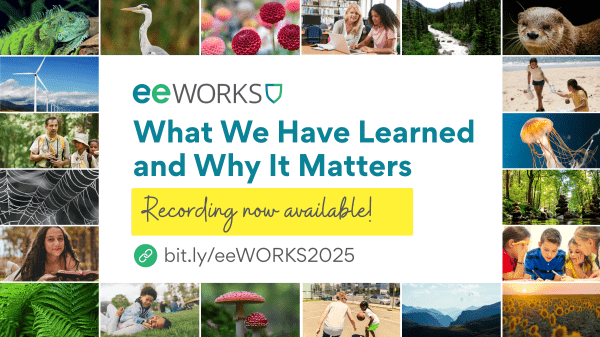eeWORKS: What We Have Learned and Why It Matters

This webinar took place on June 18, 3:00 PM ET.
This webinar explores the lessons learned over the past decade of eeWORKS, a collaborative research project of NAAEE, Stanford University, University of California at Davis, and the University of Florida. This project has explored how environmental education (EE) leads to positive outcomes in K–12 education, conservation, early childhood, positive youth development, community science, and climate education.
In this webinar, you will hear from and interact with the talented research team who have reviewed hundreds of studies examining what the research says about the value and impact of EE. We will also discuss how the lessons learned can help you in your work—from writing proposals to understanding how to integrate the research into what you do.
Guest Speakers:

Alison Bowers, Research Associate, Social Ecology Lab at Stanford’s Doerr School of Sustainability
Alison Bowers is a research associate in the Social Ecology Lab at Stanford’s Doerr School of Sustainability. She holds a PhD in Educational Research and Evaluation from Virginia Tech. Her background and experience include working as a field-based environmental educator with the Cooperative Extension Service and at the national scale with nonprofit conservation and education organizations. Alison has an EdS in Early Childhood Special Education from George Washington University, an MFRC with a Certificate in Environmental Education and Communication from the University of Florida, and a BA in Psychology from the University of South Carolina. Her research focus is on research design and process, and she is particularly interested in research reviews, systematic reviews, and grounded theory methodology.

Dr. Martha Monroe, Professor, University of Florida
Having co-authored 12 books and manuals (including three for NAAEE); published 33 book chapters, 80 peer-reviewed journal articles, and 198 extension fact sheets; and served on 160 graduate student committees in her 20 years at the University of Florida, Dr. Martha Monroe is a prolific leader and contributor for catalyzing environmental education research. Her accomplishments working at the nexus of EE research and practice are as diverse as they are numerous, blending expertise in program evaluation, learning, professional development, and behavior change to help build capacity and empower people to participate in addressing environmental issues. Martha is a past president and long-time champion for NAAEE, and is a hallmark in environmental education research and practice.
Heidi Ballard, School of Education, University of California Davis
Heidi Ballard is Professor of Environmental Science Education and Founder and Faculty Director of the Center for Community and Citizen Science (CCS) in the School of Education at University of California, Davis. Her work focuses on what and how adults and youth learn through community science, citizen science and other forms of public participation in scientific research working toward environmental stewardship and action. She works in varied contexts, from natural history museums to Uganda farmer field schools to carceral settings, using primarily qualitative research methods in partnership with teachers, environmental educators, research scientists, and community-based organizations. She conducts professional development trainings for teachers, environmental educators in using CCS to support learning and action, and graduate students and researchers in participatory action research methods.

Nicole Ardoin, Associate Professor of Environmental Behavioral Sciences at the Stanford Doerr School of Sustainability
Nicole Ardoin is an associate professor of Environmental Behavioral Sciences at the Stanford Doerr School of Sustainability and a senior fellow at the Woods Institute for the Environment, Stanford University. She was Stanford's lead researcher on the eeWORKS initiative in partnership with NAAEE. Professor Ardoin´s research focuses on environmental behavior as influenced by environmental learning and motivated by place-based connections. In particular, she is interested in considerations of geographic scale, which is an understudied yet crucial aspect of people-place relationships in a rapidly globalizing, urbanizing world. Professor Ardoin and members of her Social Ecology Lab work in collaboration with informal organizations, including museums, zoos/aquariums, parks, and residential environmental education programs, with an emphasis on using innovative, non-traditional metrics and adaptive management approaches. She is also interested in philanthropic support of environmental learning initiatives and emergent trends in the field of environmental education research.